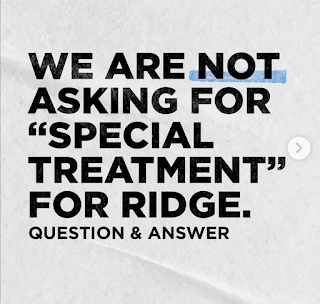We Are NOT Asking For Special Treatment Q&A
“It seems like you are asking that he be ‘let off’. Why should he get special treatment?”
We are asking for the laws of Japan and Ridge’s rights as guaranteed by SOFA to be applied to his situation. Which would include Ridge be given a suspended sentence, and that he be allowed to freely return to the United States.
This is not special treatment, we are asking for his basic rights to be respected.
“It’s a different system, didn’t he know the risks when he moved there?”
Under SOFA (Status of Forces Agreement), The US agreed to let military personnel be under Japanese jurisdiction based on their written law.
The Japanese did not follow their written legal procedures or SOFA in Ridge’s case. Subsequently, the US military and government failed to intervene and SOFA did not protect the service member. Many US servicemen and women stationed in Japan are uninformed about the lack of human rights in the Japanese system.
“Is there a reason he did not receive medical attention?”
This is unclear. Japanese police never accused Ridge of being under the influence of drugs or alcohol and initially admitted they did not know why he lost consciousness.
Not receiving medical treatment was not only in direct violation of SOFA rights, but failing to provide immediate medical attention in some instances of loss of consciousness is fatal.
Ridge should have, for his own safety, been taken to the hospital and evaluated before ever being taken into police custody. Ridge did not even know what happened to him until being evaluated by Navy doctors after his 26-day detention.
“Isn’t negligent driving a crime in the US too?”
Many states have laws referring to these unfortunate accidents as “acts of God.” Over 45 states have laws specifically protecting people who experience medical emergencies while driving.
In Japan, Ridge was charged with “negligent driving resulting in death and injury”; a comparable charge to “vehicular manslaughter” (causing the accidental death of another while acting recklessly or negligently or illegally) in the US.
Ridge was driving approximately 28 mph when he lost consciousness. He was not intoxicated or under the influence of any substance. He was alert and in the middle of a conversation. His family was in the car. There was no negligence or recklessness leading up to the accident.
“Japanese law doesn’t protect people who have medical emergencies?”
Japanese law is actually written in such a way that emphasizes the punishment of negligent acts, not accidental or unintentional acts.
One Japanese legal scholar even notes that in Japan “You will not be compensated…if the harm [you receive] is of the type which is caused by an ‘Act of God.’”
However, Japan does not typically follow their written law in favor of cultural legal precedent and Japanese police often coerce the accused to agree with police narratives.
(Source: Articles 209-211 of Japan’s Penal Code; Articles 709 and 713 of Japan’s Civil Code; “Tort Liability in Japan,” Jun Tsunematsu)
